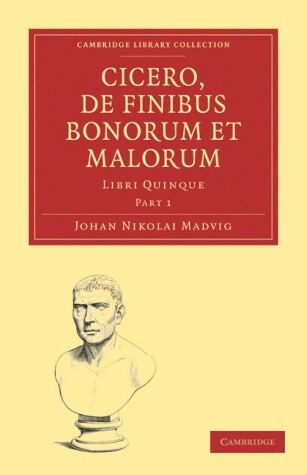Cambridge Library Collection - Classics
3 total works
Cicero, De Finibus Bonorum Et Malorum
by Johan Nicolai Madvig and Marcus Tullius Cicero
Published 31 August 2010
Published in Copenhagen in 1879, this Cambridge edition is the third edition of Cicero's De Finibus by Johan Nicolai Madvig (1804-1886), first published in 1839. A Danish politician and leading classical scholar at the University of Copenhagen, Madvig was critical of what he considered careless German scholarship, and he sought a return to a truer manuscript tradition. His work focussed on Cicero and culminated in the first edition of De Finibus, which defined the standard for sound textual criticism. De Finibus Bonorum et Malorum (On the Ends of Good and Evil) is the most extensive of Cicero's works, in which he criticises three ancient philosophical schools of thought: Epicureanism, Stoicism, and the Platonism of the Academy of Antiochus. This third edition contains a revised preface outlining Madvig's method of ranking texts, and the five books of De Finibus.
Published in Copenhagen in 1879, this Cambridge edition is the third edition of Cicero's De Finibus by Johan Nicolai Madvig (1804-1886), first published in 1839. A Danish politician and leading classical scholar at the University of Copenhagen, Madvig was critical of what he considered careless German scholarship, and he sought a return to a truer manuscript tradition. His work focussed on Cicero and culminated in the first edition of De Finibus, which defined the standard for sound textual criticism. De Finibus Bonorum et Malorum (On the Ends of Good and Evil) is the most extensive of Cicero's works, in which he criticises three ancient philosophical schools of thought: Epicureanism, Stoicism, and the Platonism of the Academy of Antiochus. This third edition contains a revised preface outlining Madvig's method of ranking texts, and the five books of De Finibus.
Published in Copenhagen in 1879, this Cambridge edition is the third edition of Cicero's De Finibus by Johan Nicolai Madvig (1804-1886), first published in 1839. A Danish politician and leading classical scholar at the University of Copenhagen, Madvig was critical of what he considered careless German scholarship, and he sought a return to a truer manuscript tradition. His work focussed on Cicero and culminated in the first edition of De Finibus, which defined the standard for sound textual criticism. De Finibus Bonorum et Malorum (On the Ends of Good and Evil) is the most extensive of Cicero's works, in which he criticises three ancient philosophical schools of thought: Epicureanism, Stoicism, and the Platonism of the Academy of Antiochus. This third edition contains a revised preface outlining Madvig's method of ranking texts, and the five books of De Finibus.

